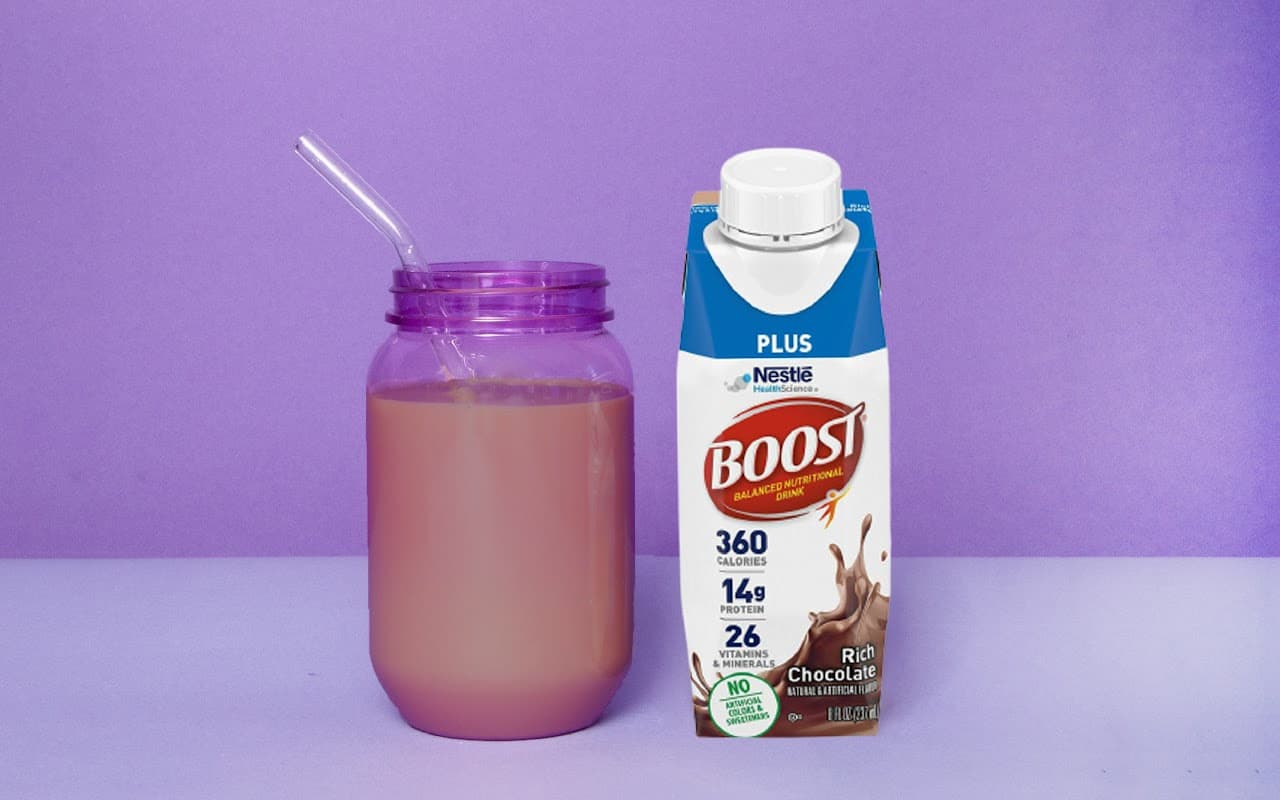Pros and Cons of Nutritional Supplement Drinks for Older Adults
Written by Carewell Team on Mon Nov 28 2022.

Unintended weight loss and loss of appetite are significant concerns for many older adults and their caregivers. While often seen, they are not a normal part of aging and warrant immediate medical attention. Approximately 25% of seniors experience unintentional weight loss, and consulting a doctor is crucial to identify and address any underlying health issues.
Sometimes, nutritional supplement drinks, often referred to as "meal replacement drinks," are recommended to help seniors gain or maintain weight. These high-calorie drinks are typically fortified with essential vitamins, minerals, and protein. This comprehensive guide will help you understand nutritional shakes for seniors, including when and how to incorporate them safely into a diet.
Understanding weight loss in aging adults
Weight loss in older adults can stem from various complex factors, making it challenging to pinpoint the exact cause. It's disheartening to know that nearly 28% of seniors experiencing weight loss may never identify the root reason, underscoring the importance of medical consultation. A doctor can help detect underlying health conditions contributing to the decline in weight.
Common reasons for unexplained weight loss in the elderly include:
Medication side effects: This can manifest as dry mouth, difficulty swallowing (dysphagia), or altered taste and smell.
Dietary challenges: Difficulty with meal planning, preparation, or accessing nutritious food.
Oral health issues: Poorly fitted dentures or dental pain.
Mobility challenges: Leading to muscle loss and reduced activity.
Mental health: Conditions like depression or social isolation impacting appetite.
Cognitive decline: Alzheimer's or dementia affecting eating habits.
Digestive issues: Malabsorption or other gastrointestinal problems.
Chronic diseases: Such as diabetes or thyroid disorders.
Ignoring decreasing body weight and poor nutrition can have serious consequences, increasing the risk of falls, broken bones, other health conditions, and even raising mortality rates in older adults.
Nutritional needs oolder adults
Our understanding of a healthy diet often centers on low-sugar, low-fat, and low-calorie intake. However, these criteria aren't always beneficial for seniors, whose nutritional needs change with age. While a balanced diet rich in fruits, vegetables, and whole grains with minimal added sugar remains ideal, older adults struggling with weight loss should not restrict calories or fat.
Always consult your doctor regarding specific dietary concerns. If you or a loved one are experiencing unintended weight loss later in life, it's perfectly acceptable to adjust your approach to food. Sometimes, a mindset shift is necessary, embracing the fact that bodies and their needs evolve. If your body requires extra calories, enjoying that scoop of ice cream or a higher-calorie snack can be beneficial.
Tips for encouraging eating in seniors
As nutritional needs and lifestyles change with age, some older adults may struggle to maintain consistent eating habits. Here are practical tips for encouraging appetite and ensuring adequate nutrition:
Eat what you enjoy! Food isn't just fuel; it's a pleasure. Encourage incorporating favorite foods into daily life (in moderation, of course) to make eating more appealing.
Eat throughout the day: Many seniors find large meals challenging. Instead, focus on smaller, more frequent meals and snacks spread throughout the day.
Stock healthy, high-calorie snacks: Keep easy, nutritious snacks readily available. Think cheese, nuts, fruit, yogurt, popcorn, and trail mix.
Consider meal delivery services: Explore customizable meal delivery options that cater to specific dietary needs and often require minimal cooking.
Stay active: Regular, light exercise can significantly increase appetite. While activity burns calories, the boost in hunger can encourage necessary caloric intake, aiding those experiencing unexplained weight loss.
Pros & cons of nutritional supplement drinks for seniors
Nutritional supplement drinks can be a valuable tool if other strategies for stimulating appetite or increasing weight haven't been successful. Before adding them to your diet or a loved one's, it's essential to understand their benefits and potential drawbacks, and always consult a doctor for personalized recommendations.
Pros of nutritional supplement drinks:
Prevents weight loss: Their primary benefit is to prevent or reverse unintentional weight loss. They provide a quick, easy, and often palatable way for seniors with low appetite or health issues to get much-needed calories and nutrients.
Increased protein intake: Protein is vital for maintaining muscle mass and bone health as we age. Adults over 65 are recommended to increase their protein intake (around 65-85 grams daily, depending on weight). Many nutritional shakes for seniors are excellent sources of additional protein, though it's crucial to read labels carefully as protein content varies.
Convenience: For caregivers, these drinks offer a simple and effective way to ensure a loved one receives an extra nutritional boost. For seniors finding meal preparation challenging, they provide a stress-free source of calories, vitamins, and minerals.
Cons of nutritional supplement drinks:
High sugar content: A major drawback of many popular nutritional supplement drinks is their high sugar content. Excessive sugar intake can lead to high blood pressure, high cholesterol, heart disease, diabetes, and dental problems. Many products exceed daily sugar recommendations, so always check the label as the risks can outweigh the benefits.
Digestive problems: As we age, digestive issues can become more common, and certain ingredients in supplements might exacerbate them, leading to diarrhea, constipation, bloating, or nausea. Carefully review the ingredient list and discuss any concerns with a doctor to find a suitable option.
Medication interactions: Many nutritional supplement drinks are rich in vitamins and minerals, some of which can negatively interact with medications. Given that a significant percentage of seniors take multiple prescription drugs daily, it's crucial to consult your doctor about potential interactions. For example, high Vitamin K levels in some supplements can reduce the effectiveness of blood thinners, leading to serious complications.
How to choose a nutritional supplement drink for seniors
Before adding a nutritional supplement drink to your diet or a loved one's, the first step is always to talk to your doctor. It's essential to rule out any underlying health conditions contributing to weight loss and address other factors affecting appetite.
If your doctor agrees that a nutritional supplement drink is appropriate, get their specific recommendations based on individual dietary needs and any existing health conditions or medications. After that, experiment with a few different brands and flavors. There are many options available with varying tastes and textures, so finding one that is enjoyable is key to consistent use.
Remember, nutritional supplement drinks are, as their name suggests, supplements. They are not intended to replace all meals and will not meet all of a person's nutritional requirements. While they can be used as a convenient snack or to replace a single meal, real, whole foods remain the best way to maintain overall health.
Carewell's best nutritional drinks for seniors:
Need more information?
Finding a nutritional supplement drink that's right for your needs or that of a loved one can be challenging. Carewell is here to help. If you need help finding the perfect product, talk to our Care Team today. Call (800) 696-CARE.
Other Articles You May Like

Top Boost Nutritional Drinks of 2025 Ranked
Boost is a leading provider of nutritional drinks that meets the needs of any consumer. Their mission is to help people live happier, healthier lives by making it easy to get the extra protein, calories, and nutrition needed for everyday living.
See how they rank. >
The Best Nutrition Drinks for Adults and Seniors for 2025
Scratching your head and wondering about the many flavors, consistencies, and ingredients in the wide range of nutrition drinks on the market today? Wonder no more! We’ve put together some frequently asked questions from our members, along with a list of our best-selling nutrition shakes and drinks for adults.
Read More >